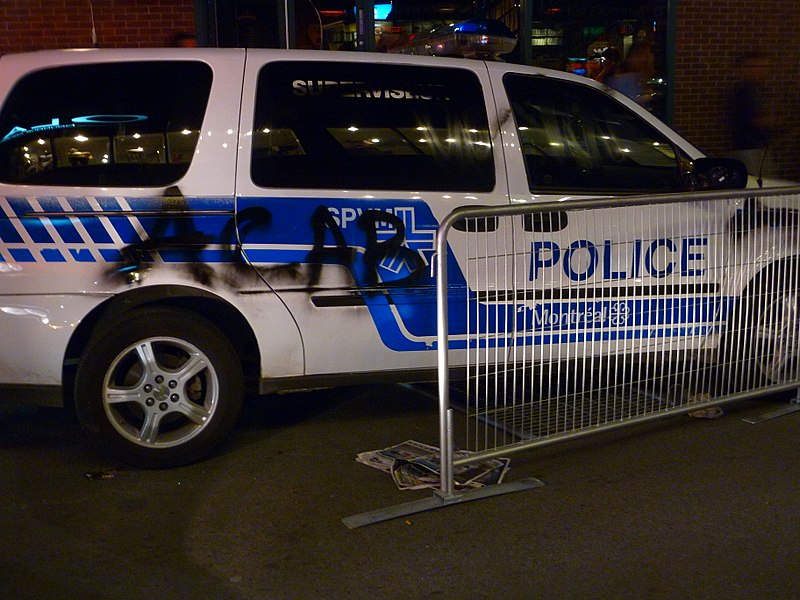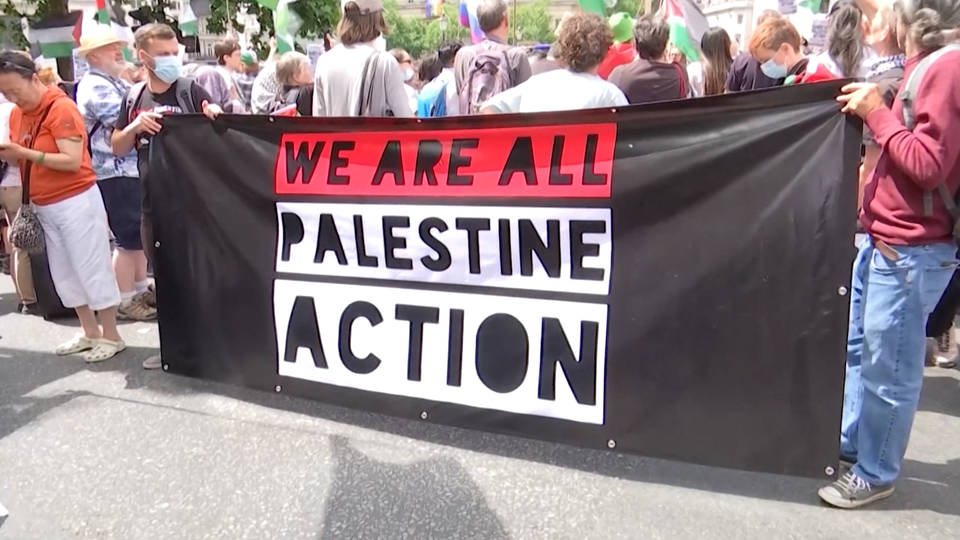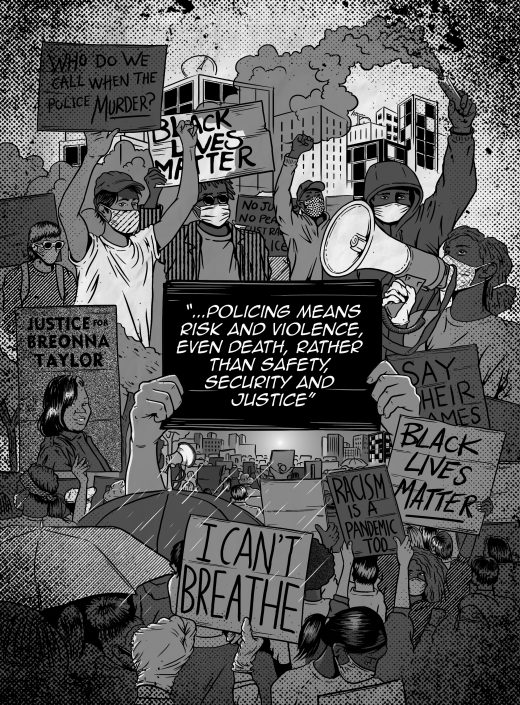by Cyril Winstanley
Recent events have highlighted what most people knew already. The police are not fit for purpose.
Protests around the world show that people recognise that police forces serve the same function everywhere. We understand what their purpose is and it is not to ‘serve and protect’ ordinary people, least of all those who are black and working class. This is not surprising as they are based on the logic of colonialism.
‘Don’t Hate the Player, Hate the Game’
The problem is not just with individual sadists like Derek Chauvin. The culture of the institution means that the ‘good’ officers do not intervene. A few sound apples cannot rescue a rotten barrel.
We all know that Chauvin would not have been charged if had not been for the witnesses’ graphic video, the subsequent efforts of Floyd’s family and the protests. The original autopsy declared Floyd’s death to be caused by ‘underlying health conditions’ and ‘intoxicants’. These systematic cover-ups excuse police murders time and again in every country in the world. It is time they were abolished.
Public Servants
Why do so many people hate the police? Public servants are well-liked. In this country. despite the attempt to blame the Grenfell tragedy on fire fighters, and despite the occasional tragic accident involving an ambulance, we do not say, ‘fuck the fire brigade’ or ‘fuck paramedics’.
There have been bad doctors. Harold Shipman abused his position of privilege and trust to become a mass-murderer. The hierarchies within the health service and reverence for rich, supposedly educated, white men in positions of power no doubt contributed to him going undetected for so long. Yet, he did not, in the end, escape justice. We do not say ‘All Doctors Are Bastards’. He was the exception in a system whose purpose, even with all its problems, is still primarily to heal the sick.
What are the police doing differently to make them so disliked?
Most obviously, neither fire engines nor ambulances need to patrol the streets looking for fires, or seeking out wounded and sick people. They come when we call them and we are grateful when they do. They do not stop people on suspicion of illness or raid houses where they believe fire alarms are not fitted properly.
Serving Whose Interests?
The police abandoned the first investigation into Shipman’s case. Would they have done this if he were black or if he had a job of lower social status? Whose interests are they really serving?
The police only began 200 years ago. Robert Peel’s Metropolitan Police Service was modelled on the Thames River Police, who were established 20 years previously in order to protect the cargo from slave plantations being stolen by London dock workers. From the beginning the police’s purpose was clear – to protect the oppressive practices and the wealth of the rich – and from the start there have been calls to abolish them.
How Abolition Can be a Realistic Solution
Abolition is just one part of the solution. As Alex Vitale explains, abolishing the police, ‘goes hand in hand with decriminalizing sex work, drugs, homelessness, mental illness. … We need counsellors and restorative justice programs. … supportive housing, community based drop-in centers, social workers.’
As a society we have been led to believe that without police there would be rapes, murders and violence. It is not enough to point out that there are already rapes, murders and violence (some of which the police are directly responsible for). Myths such as Lord of the Flies (written by a Nazi sympathiser) and ,more recently, The Purge, keep us in fear of a world without state control.
Whatever the ‘racial’ make-up of an area, there is a clear link between poverty and ‘crime’. Good public services, employment and education are much more effective at reducing ‘crime’ than the police have ever been. The state needs to address the problems it has created – and then exacerbated by a decade of austerity. No amount of police on the street addresses the real problems underlying most ‘crimes’.
Self-Organised Society
The safest society is one which looks out for itself. The more that people feel able to intervene when they see someone being attacked, abused or insulted then the safer our streets and neighbourhoods are. Communities where people feel ownership over the institutions and infrastructure of their areas have less crime. Abolitionists point out that the huge amount of money spent on police forces could be used in many different and beneficial ways. In a police-free world, communities could be given their own budgets to manage. They could allocate funds to local initiatives that they think would solve local problems. This would have the triple benefit that money would reach projects where it is most needed; communities would care more about those projects as they would have responsibility over them; and democratic structures would have to be established for local people to make those decisions. If a community knows its neighbours, owns its businesses, and oversees its own budget for local services, people act with more care for each other.
An Interim Public Service
Although it is clear that the police as they exist must be abolished, we are not yet ready to abandon entirely a professional body that helps keep people safe. We cannot let mobs and militia take over before we have an alternative in place. As an immediate move, we should establish a Public Service body.
Just like the fire brigade and ambulance service, such a body would only respond to calls from the public. A service such as this could respond at least as quickly as the police do now. People could still call them to investigate or intervene in violence against their property or their person. But there could be additional functions too. Those who are lonely or need help around the home might call them. There could be a specific women-led team to deal with domestic violence. This Public Service would need a range of skills such as conflict resolution, listening and empathy, that are very different from those which the police use today. As with other emergency services they would still have a say over prioritising calls. Crucially, however, they would be responding to our calls rather than following the dictates of their hierarchy.
Young black people are among the most likely to be victims of crime. Yet, at present, very few of them would ever call the police if they felt vulnerable. This is because they are more likely to get someone who will harass them than someone who will prevent harassment. This was shown recently when a large group of white football fans in Coventry chased two black men into a corner, surrounded them and threw bottles at them. The police arrived and, immediately arrested the black men. Instinctively, the police sided with the lynch mob.
Recent Events Show that the Police Do Not Prevent Violence
Recently, there was a block party in one area of Harlseden, London. A reported 500 people attended. The party was not sensible from a medical point of view. It was, however, in law and order terms, peaceful, despite it being a large, all-night party in a supposedly high-crime area, and despite the potential provocation of the police’s response. The police issued a statement saying, ‘Local residents should be reassured we will be increasing our patrols in the area following the incident.’ Most ‘local residents’ would have understood this as a threat.
The very next day, a group of people were shot in the streets of that same area, injuring three adults and leaving a two year old child in a critical condition. We do not have words to describe our abhorrence for such an act. We condemn its horror and we are fearful as to how this will continue. It is clear, however, that the increased police patrols did not act as a deterrent and did not prevent this appalling tragedy. The police are not suitable for preventing the spread of corona virus nor for stopping violence.
Who Polices the Police?
The police’s own violence is enacted with impunity. In this country, there have been 1741 deaths in police custody since 1990 without a single successful prosecution. We call for their abolition and the establishment of a new public service, answerable to us and responsive to our calls. All members of this service should be held to account for their actions should they assault anyone or wrongfully restrict their liberty, in the same way as any other member of society. We welcome any police officer who will support this proposal.
Abolish the Border Force
There can be no call to abolish the police without also abolishing that other instrument of racist state violence: the border force. As long as the state exists, there will be borders. Yet, it was only 120 years ago that were no immigration controls at all. The first laws on immigration were all racialised: e.g. to stop Chinese immigrants to the USA or the arrival of Eastern European Jews to Britain.
The UK Border Force was only created in 2007. Its purpose is not to process asylum claims, but to keep out ‘undesirable’ migrants. Since 2014, there have been at least 4000 deaths every year on migration routes worldwide
Creating Illegality
If border forces are meant to stop illegal immigration then they have spectacularly failed. By removing legal routes to entry, the border regime creates illegality. Nobody wants this, least of all the migrants themselves.
States use these militarised border forces to avoid their obligations under the Geneva Convention. If they were forced to face them, they would make more effort to remove the causes of migration in the first place: the wars they have started; the climate change their economic policies have brought on; the debt they continue to impose on the global south; the unjust trade policies; the deforestation and enclosure of land for profit.
Unequal Burden of Proof
There may be cases where a nation can legitimately refuse someone the right to settle inside their borders. At present, however, the onus on proving rights is entirely weighted on the applicant rather than the state, who can delay, refuse, detain and deport with near impunity. If the state has good reason to deny someone right to enter, they should prove their case in a fair and transparent way.
Processing Applications Before the Border
If we are to live in a world where there must be visas and passports, there is no reason why immigration applications and asylum claims could not be made in embassies. If, for example, Syrian people fleeing war could apply for asylum in the British embassy in Beirut, it would save the unnecessarily dangerous and expensive journey to get to the UK. People could get on a flight rather than paying smugglers and risking their lives to arrive in a country where they may find themselves in a detention centre or left destitute with no right to work and no ‘recourse to public funds’.
An immigration service should be there to help people settle in a new country. This is after all what ‘immigration’ means. Their job could be to help new arrivals find housing and work, access services, language classes or whatever else is needed to enable them to settle comfortably in a new land.
The rich have nearly unrestricted rights to move around the world. For their enjoyment of this right, we have border forces which criminalise movement for the majority of people. Border controls force migrants underground into squalid conditions and cause thousands of unnecessary deaths. For the majority of media, politicians and security services, these lives do not matter because they are not white and not British.
Too Radical?
These may seem like radical demands. That depends on your perspective. Our current predicament requires radical solutions, ones that allow ordinary people to reclaim the policing of their communities and open up freedom of movement to all people of the world.
All good ideas begin as minority ideas. Not so long ago it seemed impossible that (for example) women and working class people would be allowed the vote; that we would ever abolish the death penalty; or that homosexuality would be legal.
There is no sense in reforming and continuing with institutions whose actual function clearly goes against their stated purpose (enforcing justice, preventing crime etc). They must be abolished and new services set up that can go towards building a world based on justice and peace for all.
Abolition of police, prisons and borders is not a new idea. There is a huge amount you can read or watch about it. Here are links to just a few:
Great list of articles, books and zines here from Minneapolis activist group: https://www.mpd150.com/resources/
Practical example of police-free society in Rojava: https://hawzhin.press/2020/06/01/how-to-abolish-the-police-lessons-from-rojava/
Community Action on Prison Expansion, UK campaign group: https://m.facebook.com/capecampaignuk/
Recent talk with Feminist perspective on prison abolition: https://www.youtube.com/watch?v=IlHQgVMhFXY
List of recent US articles on police abolition: https://www.themarshallproject.org/records/3382-police-abolition
Six week study guide for those new to abolition:
Another collection of US resources on abolition:
https://www.chicagoreader.com/chicago/the-reader-guide-to-understanding-police-abolition/
The Monitoring Group – UK family justice campaign and anti-racist group.
Netpol– UK Network for Police Monitoring
United Families and Friends Campaign – UK coalition of those affected by deaths in police, prison and psychiatric custody





